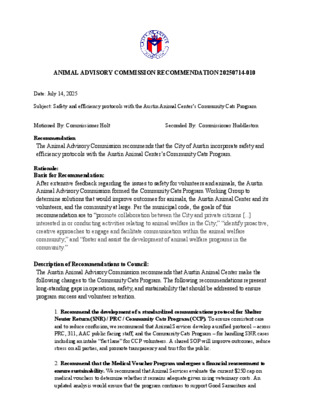Recommendation 20250714-010 - Safety and efficiency protocols with the Austin Animal Center’s Community Cats Program — original pdf
Recommendation

ANIMAL ADVISORY COMMISSION RECOMMENDATION 20250714-010 Date: July 14, 2025 Subject: Safety and efficiency protocols with the Austin Animal Center’s Community Cats Program Motioned By: Commissioner Holt Seconded By: Commissioner Huddleston Recommendation The Animal Advisory Commission recommends that the City of Austin incorporate safety and efficiency protocols with the Austin Animal Center’s Community Cats Program. Rationale: Basis for Recommendation: After extensive feedback regarding the issues to safety for volunteers and animals, the Austin Animal Advisory Commission formed the Community Cats Program Working Group to determine solutions that would improve outcomes for animals, the Austin Animal Center and its volunteers, and the community at large. Per the municipal code, the goals of this recommendation are to “promote collaboration between the City and private citizens [...] interested in or conducting activities relating to animal welfare in the City;” “identify proactive, creative approaches to engage and facilitate communication within the animal welfare community;” and “foster and assist the development of animal welfare programs in the community.” Description of Recommendations to Council: The Austin Animal Advisory Commission recommends that Austin Animal Center make the following changes to the Community Cats Program. The following recommendations represent long-standing gaps in operations, safety, and sustainability that should be addressed to ensure program success and volunteer retention. 1. Recommend the development of a standardized communications protocol for Shelter Neuter Return (SNR) / PRC / Community Cats Program (CCP). To ensure consistent care and to reduce confusion, we recommend that Animal Services develop a unified protocol – across PRC, 311, AAC public facing staff, and the Community Cats Program – for handling SNR cases including an intake “fast lane” for CCP volunteers. A shared SOP will improve outcomes, reduce stress on all parties, and promote transparency and trust for the public. 2. Recommend that the Medical Voucher Program undergoes a financial reassessment to ensure sustainability. We recommend that Animal Services evaluate the current $250 cap on medical vouchers to determine whether it remains adequate given rising veterinary costs. An updated analysis would ensure that the program continues to support Good Samaritans and provides equitable access to urgent veterinary care for community cats. 3. Recommend refining volunteer identification materials to improve visibility and safety in the field. While volunteer shirts and badges have been developed, we recommend ongoing collaboration with field trappers to ensure gear meets operational needs—specifically visibility, credibility, and safety when working in public spaces. Identifiable gear improves interactions with the public and reflects the City’s commitment to volunteer support. Since these needs are ongoing and constantly evolving, suggestions for ensuring continued and transparent communication include a quarterly town hall where all trapping volunteers are invited to meet with Community Cats staff and Austin Animal Center leadership. 4. Recommend evaluating options for a mobile-friendly volunteer coordination and request tracking system. We recommend exploring tools that allow volunteers to access trapping requests and log activity through a secure, mobile-accessible platform. The current system depends on static spreadsheets and informal coordination, which creates risk and reduces program resilience. A mobile-accessible system would improve response times and create transparency for both staff and volunteers in the field. 5. Expand staff and volunteer support for the Community Cats Program. Given the large number of homeless and feral cats in Austin/Travis County, and the overwhelming increase in stray kittens that the shelter and community face each kitten season, we recommend proactive staffing measures. We recommend that Austin Animal Center dedicate 2 full time employees to building, improving, and sustaining this program. This includes creating a Volunteer Coordinator and/or Lead Volunteer role(s) since the needs of this program are unique from other volunteer roles and responsibilities that the existing volunteer program is designed to support. Staffing expansion should also include consideration for staff that will serve as a dedicated trapper for high conflict, highly complex or emergent trapping needs- either directly through the Community Cats staff or through collaboration and prioritization with Animal Control staff. This role would support volunteers in difficult field situations and improve the City’s responsiveness in cases that are emotionally charged such as hoarding, sick, or injured cats. If staff capacity does not allow for this possibility, we recommend contracting dedicated trappers who are available for high conflict, highly complex and/or emergent trapping cases as they arise. Vote 9-0 For: Commissioners Ahmed, Clinton, Dulzaides, Ferguson, Holt, Huddleston, Loignon, Nilson and Norton Against: None Abstain: None Absent: Vice Chair Linder and Commissioner Nemer Attest: Christi Vitela [Staff or board member can sign] 3 of 3